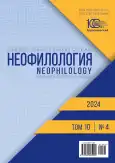Nominations of women by profession in modern Russian (based on survey materials)
- Authors: Zhao J.1, Chernyshova T.V.1
-
Affiliations:
- Altai State University
- Issue: Vol 10, No 4 (2024)
- Pages: 800-811
- Section: RUSSIAN LANGUAGE. LANGUAGES OF PEOPLES OF RUSSIA
- URL: https://journal-vniispk.ru/2587-6953/article/view/295620
- DOI: https://doi.org/10.20310/2587-6953-2024-10-4-800-811
- ID: 295620
Cite item
Full Text
Abstract
INTRODUCTION. The purpose of the study is to determine, based on a questionnaire, the role and adaptive capabilities of women’s nominations by profession and in the modern Russian language.MATERIALS AND METHODS. The research material consists of 50 questionnaires received during a survey of students at Altai State University, as well as literary texts presented in the National Corpus of the Russian Language. The following methods were used: questionnaires; continuous sampling method; word-formation, comparative, quantitative analysis.RESULTS AND DISCUSSION. It was revealed that the acceptability of gender neologisms is supported by both the social significance of nominations by profession in the feminine form (symmetry, clear indication of the person's gender) and the facts of natural language development. The unacceptability of using such nominations is based on the healthy conservatism of a significant part of the respondents and the desire to preserve established norms and traditions. A variety of wordformation suffixes used to create feminine forms from masculine professional names was revealed.CONCLUSION. The results of the survey allow us to state that gender nominations of women by profession are a fact of the modern Russian language, requiring close attention and study both in the functional, word-formation, and sociolinguistic aspects.
About the authors
Jing Zhao
Altai State University
Email: 1079829756@qq.com
ORCID iD: 0009-0005-7518-2317
Post-Graduate Student, General and Applied Philology, Literature and Russian Language Department
61 Lenin Ave., Barnaul, 656049, Altai Region, Russian FederationT. V. Chernyshova
Altai State University
Author for correspondence.
Email: chernyshova@filo.asu.ru
ORCID iD: 0000-0001-5927-9745
Dr. Sci. (Philology), Professor, Professor of General and Applied Philology, Literature and Russian Language Department
61 Lenin Ave., Barnaul, 656049, Altai Region, Russian FederationReferences
- Zyuzina O.N., Ilina D.V., Kim I.E. The grammatical category of gender in russian and the conceptual and axio-logical row “masculine – feminine”: from ethnosemantics to new gender semantics. Vestnik Tomskogo gosu-darstvennogo universiteta = Tomsk State University Journal, 2021, no. 473, pp. 48-57. (In Russ.) https://doi.org/10.17223/15617793/473/7 , https://elibrary.ru/dvpvjm
- Ilyasova S.V., Pugacheva E.V. Feminization of feminitives. Filologiya i kul’tura = Philology and Culture, 2021, no. 3 (65), pp. 12-17. (In Russ.) https://doi.org/10.26907/2074-0239-2021-65-3-12-17, https://elibrary.ru/bwzpoe
- Godizova Z.I., Jin L. Feminitives in modern Russian: a system-functional aspect. Verkhnevolzhskii filologi-cheskii vestnik = Verhnevolzhski Philological Bulletin, 2022, no. 4 (31), pp. 44-52. (In Russ.) https://doi.org/10.20323/2499_9679_2022_4_31_44_52, https://elibrary.ru/akjugl
- Ulanova E.E. The study of gender representation of language personality of a conference interpreter. Filologiya i chelovek, 2024, no. 3, pp. 51-69. (In Russ.) https://doi.org/10.14258/filichel(2024)3-04, https://elibrary.ru/izionn
- Pechonkina E.A. Gender asymmetry in modern Russian language: female professional nominatives. Sbornik statei Natsional’noi nauchnoi konferentsii (k 125-letiyu so dnya rozhdeniya M.M. Bakhtina) «Aktual’nye voprosy filologii i metodiki prepodavaniya filologicheskikh distsiplin» = Proceedings of Articles from the National Scientific Conference (For the 125th Anniversary of M.M. Bakhtin’s Birth) “Current Issues of Phi-lology and Methods of Teaching Philological Disciplines”. Kemerovo, 2020, pp. 59-62. (In Russ.) https://elibrary.ru/ddvxhh
- Ilyasova S.V., Pugacheva E.V. Feminitiviti nominative and derivational aspects. Filologicheskii klass = Philo-logical Class, 2022, vol. 27, no. 4, pp. 54-66. (In Russ.) https://doi.org/10.51762/1FK-2022-27-04-05, https://elibrary.ru/gbmeqy
- Mineeva Z.I. Feminitives with suffix‘-shits(a)/-chits(a)’. Nauchnyi dialog, 2020, no. 7, pp. 142-157. (In Russ.) https://doi.org/10.24224/2227-1295-2020-7-142-157, https://elibrary.ru/wzisos
- Zakharchuk E.A. Feminitives in contemporary communication space: the issues of derivation and use. Voprosy zhurnalistiki, pedagogiki, yazykoznaniya = Issues in Journalism, Education, Linguistics, 2021, no. 40 (3), pp. 378-387. (In Russ.) https://doi.org/10.52575/2712-7451-2021-40-3-378-387, https://elibrary.ru/lyjond
- Shalimova P.A., Maksimycheva M.S. Ways of nomination of females by their occupation in modern Russian language. Vestnik Chuvashskogo gosudarstvennogo pedagogicheskogo universiteta im. I.Ya. Yakovleva = I. Yakovlev Chuvash State Pedagogical University Bulletin, 2023, no. 1 (118), pp. 59-66. (In Russ.) https://doi.org/10.37972/chgpu.2023.118.1.008, https://elibrary.ru/gepkly
- Zamyshlyaeva Yu.S. The problem of nomination of women by occupation in the headlines of modern media. Vestnik Chelyabinskogo gosudarstvennogo universiteta = Bulletin of Chelyabinsk State University, 2021, no. 7 (453), pp. 77-82. (In Russ.) https://doi.org/10.47475/1994-2796-2021-10710, https://elibrary.ru/wdjjhq
- Chernyshova T.V., Zhao J. From the history of the formation of names of persons by profession in the modern Russian language: the gender aspect. Filologiya i chelovek, 2024, no. 3, pp. 37-50. (In Russ.) https://doi.org/10.14258/filichel(2024)3-03, https://elibrary.ru/jztoep
- Kobyakov A.V. Feminitives in the mirror of neological lexicography. Uchenye zapiski Novgorodskogo gosu-darstvennogo universiteta = Memoirs of NOVSU, 2022, no. 5 (44), pp. 556-559. (In Russ.) https://doi.org/10.34680/2411-7951.2022.5(44).556-559, https://elibrary.ru/zcbruq
- Burdina E.A. Language and society within the category of gender: feminitives in modern orthology. Filologi-cheskii aspekt, 2020, no. 6 (62), pp. 72-78. (In Russ.) https://elibrary.ru/bbfnhf
- Bundova Yu.V., Ivanyan E.P. Feminitives in modern Russian discourse: linguo-methodological aspect. Po-volzhskii pedagogicheskii vestnik, 2022, vol. 10, no. 2 (35), pp. 64-68. (In Russ.) https://elibrary.ru/aulogu
- Kabisova A.A. Feminitives in the modern Russian language: ethical aspect. Sbornik trudov konferentsii «Nauchno-prakticheskii al’manakh «Kursantskii vestnik: voprosy filologii i lingvistiki» = Proceedings of Conference Papers “Scientific and Practical Almanac “Kursantsky Vestnik: Issues of Philology and Lin-guistics”. Moscow, Military University Publ., 2020, pp. 66-74. (In Russ.) https://elibrary.ru/pkyxpz
Supplementary files









